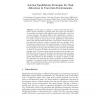Free Online Productivity Tools
i2Speak
i2Symbol
i2OCR
iTex2Img
iWeb2Print
iWeb2Shot
i2Type
iPdf2Split
iPdf2Merge
i2Bopomofo
i2Arabic
i2Style
i2Image
i2PDF
iLatex2Rtf
Sci2ools
108
click to vote
CIA
2004
Springer
2004
Springer
Auction Equilibrium Strategies for Task Allocation in Uncertain Environments
Abstract. In this paper we address a model of self interested information agents competing to perform tasks. The agents are situated in an uncertain environment while different tasks dynamically arrive from a central manager. The agents differ in their capabilities to perform a task under different world states. Previous models concerning cooperative agents aiming for a joint goal are not applicable in such environments, since self interested agents have a motivation to deviate from the joint allocation strategy, in order to increase their own benefits. Given the allocation protocol set by the central manager, a stable solution, is a set of strategies, derived from an equilibrium where no agent can benefit from changing its strategy given the other agents' strategies. Specifically we focus on a protocol in which, upon arrival of a new task, the central manager starts a reverse auction among the agents, and the agent who bids the lowest cost wins. We introduce the model, formulate ...
Central Manager | CIA 2004 | Intelligent Agents | Interested Information Agents | Self Interested Agents |
Related Content
| Added | 20 Aug 2010 |
| Updated | 20 Aug 2010 |
| Type | Conference |
| Year | 2004 |
| Where | CIA |
| Authors | David Sarne, Meirav Hadad, Sarit Kraus |
Comments (0)

